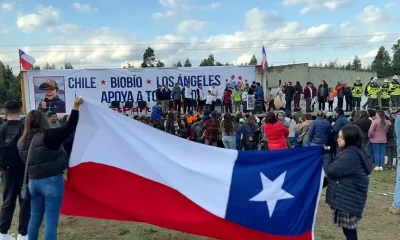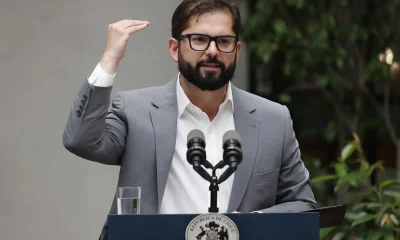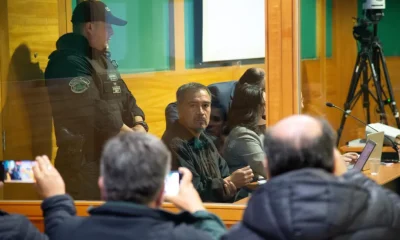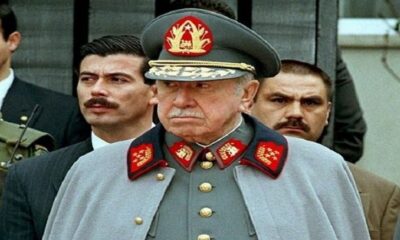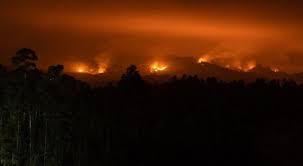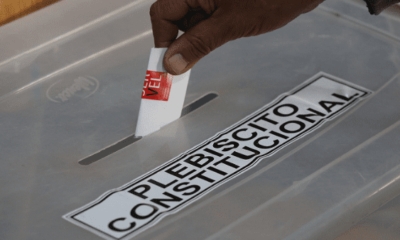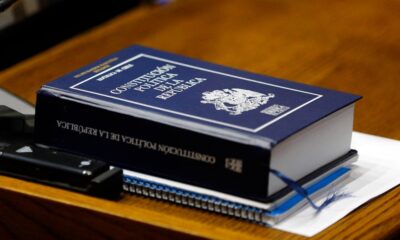International
How did the events of the coup d’état take place in Chile?
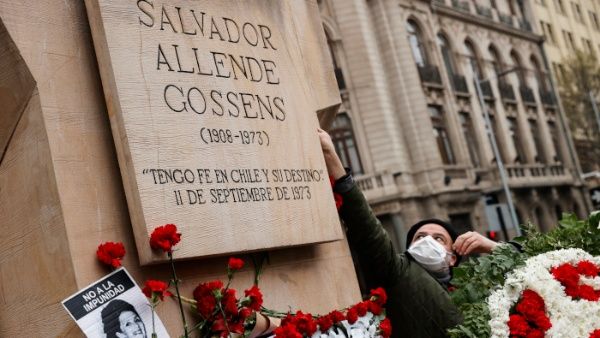
September 11 |
On September 11, 1973, General Augusto Pinochet led a coup d’état against the president of Chile, Salvador Allende, which ended the Popular Unity Government and began a military dictatorship that would leave nearly 40,000 victims during 17 years.
Pinochet, who three weeks earlier had been appointed by Allende as commander in chief of the Army, interrupted Allende’s democratic government, which had been elected in 1970, and established one of the cruelest and most terrible periods in the history of the South American nation.
In the same way, the military put an end to the experience of a socialist government that had emerged through the electoral process and sought to redefine the role of the State through agrarian reform, nationalizations, expropriation of the banks and greater promotion of education.
It was Allende himself who announced the military mobilization. Informed of the Navy’s uprising, Allende arrived at 07:30 local time on September 11 at La Moneda Palace.
Hours earlier, Navy ships had entered the port of Valparaíso, some 115 kilometers west of Santiago, and its troops occupied streets and government buildings.
President Allende, in a broadcast on Radio Corporación, asked citizens to remain calm and to stay in their workplaces, while affirming that he would remain at his post.
At 08:30 hours, the Armed Forces and Carabineros, who bombed and raided the installations of the media supporting the Popular Unity, demanded Allende’s resignation.
The president, in another radio communication, told the military that he would not resign and that he would not abandon La Moneda palace. “I point out my will to resist with whatever it takes, at the cost of my life,” he asserted.
In his last message to Chileans, broadcast on Radio Magallanes, Allende -aware of the imminent aerial bombardment of the Moneda Palace- said: “I will not resign. I will pay with my life for the loyalty of the people (…) they have the strength, they can subjugate, but social processes are not stopped neither with crime nor with force. History is ours and it is made by the people”.
An aide offered him an Air Force plane to leave Chile. Allende rejected the proposal and proposed a dialogue with the commanders-in-chief under certain conditions. However, Pinochet did not accept and demanded the unconditional resignation of the president.
Prior to the bombing of La Moneda, the president demanded a truce so that 11 women, including his daughter Beatriz, who were in the Executive headquarters, could leave.
At 11:50 a.m., the Hawker Hunter planes of Group 7 of the Chilean Air Force began the bombing that lasted 15 minutes. As a consequence, the government building was partially burned.
After 1:00 p.m., Allende, carrying a rifle and wearing a helmet, ordered the surrender and departure of those who were still accompanying him.
After that – based on a 2012 judicial investigation – Allende entered the Independence Hall, where “he sat down on a sofa, placed the rifle he was carrying between his legs and resting it on his chin, he fired it, dying instantly”.
The Military Junta, headed by Pinochet, took over the Executive and Judicial powers on September 11, and ordered the recess of Congress, establishing a 17-year military dictatorship that left at least 40,000 victims, among them 3,000 murdered or disappeared.
International
Trump Floats “Friendly Takeover” of Cuba Amid Rising Tensions

U.S. President Donald Trump said Friday that his administration is considering what he described as a “friendly takeover” of Cuba, as Washington continues to increase pressure on the island’s communist government.
“The Cuban government is talking to us and they have very serious problems, as you know. They have no money, they have nothing at this moment, but they are talking to us and maybe we will see a friendly takeover of Cuba,” Trump told reporters as he departed the White House for a trip to Texas.
Earlier in the week, U.S. Secretary of State Marco Rubio said Cuba needed a “radical change,” shortly after Washington eased restrictions on oil exports to the island for what officials described as “humanitarian reasons,” amid a deep economic crisis.
The United States has imposed an energy blockade on Cuba since January, citing what it calls an “extraordinary threat” posed by the communist-run island, located roughly 150 kilometers (90 miles) off the coast of Florida, to U.S. national security.
International
Argentina’s Senate Reviews Milei-Backed Labor Overhaul

Argentina’s Senate on Friday began reviewing the Labor Modernization Law promoted by the administration of President Javier Milei, a proposal that would significantly reshape labor rules across the country.
The upper chamber opened its final discussion of the contentious initiative, which revises the method used to calculate severance payments — lowering the amounts owed in dismissal cases — and introduces an “hour bank” mechanism that allows overtime to be offset with paid leave rather than extra wages.
The legislation also broadens the classification of essential services, a change that would place new limits on the right to strike in designated sectors.
The bill was initially approved by the Senate on February 11 and then moved to the Chamber of Deputies, where lawmakers passed it with amendments. It has now returned to the Senate for definitive approval.
Outside the Congress building in Buenos Aires, workers, trade unions and left-wing organizations staged demonstrations beginning at midday. The gathering later thinned out amid reports of disturbances and a strong police presence. Security forces had secured the area surrounding the legislature since early morning hours.
Union leaders contend that the reform weakens labor protections, while many business representatives back the measure but stress that sustainable formal employment will require economic expansion, improved credit conditions, greater investment and a more dynamic domestic market.
International
Federal Judge Blocks Trump Policy Allowing Deportations to Third Countries

A federal judge ruled on Wednesday that the policy of U.S. President Donald Trump’s administration allowing immigration authorities to deport foreign nationals to third countries without prior notice or the opportunity to object is unlawful. The decision marks another legal setback for the administration on immigration matters.
Judge Brian Murphy of the U.S. District Court for the District of Massachusetts struck down the regulation issued last year, which stated that Immigration and Customs Enforcement (ICE) was not required to notify migrants if they were to be sent to countries other than the one listed in their removal order, provided that receiving nations offered assurances they would not face persecution or torture.
Murphy ordered the measure vacated but granted a 15-day delay before the ruling takes effect, giving the Trump administration time to file an appeal.
In his decision, the judge concluded that the policy violates federal immigration law and migrants’ due process rights. He also questioned the lack of transparency surrounding the alleged assurances provided by receiving countries, stating that “no one really knows anything about these supposed ‘assurances.’” He added, “It is not right, and it is not lawful.”
The ruling follows several legal disputes involving deportations to third countries. Last year, the executive branch deported more than 200 Salvadorans to a maximum-security prison in El Salvador, invoking an old wartime law. The White House also held talks with Costa Rica, Panama, and Rwanda about receiving migrants who are not citizens of those countries.
In May, the same judge determined that the government violated a court order when it attempted to remove a group of immigrants with criminal records to South Sudan without prior notice or an opportunity to raise claims of fear of persecution.
Although President Donald Trump took the case to the U.S. Supreme Court, which temporarily allowed the deportations to resume while a final decision was pending, the White House is expected to again appeal to higher courts to overturn this latest judicial ruling.
-

 International3 days ago
International3 days agoFamily of “El Mencho” Seeks Return of Body After Deadly Military Operation
-

 International3 days ago
International3 days agoLarry Summers Steps Down from Harvard Role Amid Epstein Controversy
-

 International3 days ago
International3 days agoIran’s President Optimistic Ahead of Geneva Nuclear Talks with U.S.
-

 International3 days ago
International3 days agoBill Gates Admits “Serious Mistake” Over Epstein Ties
-

 International3 days ago
International3 days agoStephen Hawking Photo Appears in Newly Released Epstein Documents
-

 International5 days ago
International5 days agoOver 40 Million Affected by Major Snowstorm in Northeastern U.S.
-

 International2 days ago
International2 days agoCocaine Production Surges 34% in 2023 as Market Expands into Africa and Asia
-

 International5 days ago
International5 days agoNine People Killed in Two Armed Attacks in Manabí, Ecuador
-

 International2 days ago
International2 days agoFederal Judge Blocks Trump Policy Allowing Deportations to Third Countries
-

 International2 days ago
International2 days agoClinton Accuses Republican Committee of Using Epstein Case to Shield Trump
-

 International17 hours ago
International17 hours agoArgentina’s Senate Reviews Milei-Backed Labor Overhaul
-

 International17 hours ago
International17 hours agoTrump Floats “Friendly Takeover” of Cuba Amid Rising Tensions





























